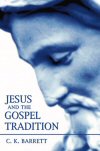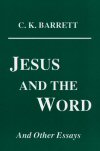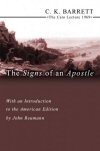Selected Essays and Lectures of C.K. Barrett (3 vols.)
Digital Logos Edition
Overview
C.K. Barrett—the influential New Testament scholar often mentioned in the same breath as F.F. Bruce, I. Howard Marshall, C.H. Dodd, and other major mid-twentieth century British biblical scholars—delivered countless lectures and penned numerous essays throughout his long career. This collection gathers lectures and essays by Barrett on historical theology, the development of Jesus traditions in the early church, the nature of apostleship in the New Testament, and more. This diverse selection provides a window into the broad range of work by a scholar who made an incalculable impact on the study of the New Testament.
In the Logos editions, these volumes are enhanced by amazing functionality. Important terms link to dictionaries, encyclopedias, and a wealth of other resources in your digital library. Perform powerful searches to find exactly what you’re looking for. Take the discussion with you using tablet and mobile apps. With Logos Bible Software, the most efficient and comprehensive research tools are in one place, so you get the most out of your study.
Don’t miss other works by C.K. Barrett in Select Works of C. K. Barrett (7 vols.).

Key Features
- Collects lectures and essays by influential New Testament scholar C.K. Barrett
- Includes Barrett’s scholarship on source material for the Gospels
- Provides essays and lectures on historical theology and the apostolic tradition in the New Testament
Product Details
- Title: Selected Essays and Lectures of C.K. Barrett
- Author: C.K. Barrett
- Publisher: Wipf & Stock
- Volumes: 3
- Pages: 578
- Christian Group: Evangelical
- Resource Type: Essays, Lectures
- Topic: Biblical Studies
Individual Titles

The Gospel writers believed that the events they reported truly happened, but the appearance of heavenly doves, supernatural voices, and miraculous transfigurations aren’t the stuff of everyday life. Modern readers hesitate to classify the Gospels as history, and yet scholars acknowledge that historical material underlies them. Meanwhile, Paul shows little interest in a historical account of Jesus’ life at all—he mines the Jesus story for doctrinal gems, tossing out a scant few references to events depicted in the Gospels.
In these lectures, famed scholar C.K. Barrett scours the New Testament for evidence of an early Gospel tradition that preserves the church’s initial understanding of the events of Jesus’ life—and their theological ramifications.
Contents
- “The Tradition”
- “Christ Crucified”
- “Christ to Come”

In these essays, C.K. Barrett lends his sharp intellect and literary sleuthing to various issues in historical theology, Johannine literature, Pauline literature, and biblical studies at large. Barrett comments on the influence and legacy of Albert Schweitzer, protognosticism in the book of Revelation, New Testament theology, and more.
Contents
- “Westcott as Commentator”
- “Joseph Barber Lightfoot as Biblical Commentator”
- “Fenton John Anthony Hort”
- “Hoskyns and Davey”
- “Albert Schweitzer and the New Testament”
- “Theology in Durham in the Ramsey Period (1940–1950)”
- “Johannine Christianity”
- “The Place of John and the Synoptics within the Early History of Christian Tradition”
- “Gnosis and the Apocalypse of John”
- “Paul: Missionary and Theologian”
- “The Significance of the Adam-Christ Typology for the Resurrection of the Dead”
- “The Gentile Mission as an Eschatological Phenomenon”
- “Pauline Controversies in the Post-Pauline Period”
- “Jesus and the Word”
- “School, Conventicle, and Church in the New Testament”
- “What is New Testament Theology?”
- “The Center of the New Testament and Canon”

What did it mean to be an apostle in New Testament times? What does it mean today? C.K. Barrett surveys the New Testament to discover who the apostles were, what they did, and the relationship between the 12 apostles and later Christian leaders such as Paul. Barrett then assesses how churches can reflect apostleship in their faith, preaching, life, and order—especially in light of radical theology and the ecumenical movement of the 1960s.
This title is included in the following collections
You can save when you purchase this product as part of a collection.
Logos 8 Methodist & Wesleyan B...
$89.99$89.99Logos 8 Methodist & Wesleyan S...
$349.99$349.99Logos 8 Methodist & Wesleyan G...
$849.99$849.99Logos 7 Methodist & Wesleyan G...
$849.99$849.99
- $849.99
- $1,499.99
- $1,499.99
- $1,499.99
- $1,499.99
- $2,999.99
- $2,999.99
- $4,749.99
- $11,593.84$8,499.99
- $21,749.99
- $23,999.99
- $24,999.99
About C.K. Barrett
C.K. Barrett (1917–2011) was emeritus professor of divinity at the University of Durham in England. A celebrated New Testament scholar, Barrett was known for numerous scholarly articles and books, including commentaries on The Epistle to the Romans, The First Epistle to the Corinthians, and The Second Epistle to the Corinthians in the Black’s New Testament Commentary (BNTC) series, as well as On Paul: Essays on His Life, Work, and Influence in the Early Church and the titles in Select Works of C. K. Barrett (7 vols.).